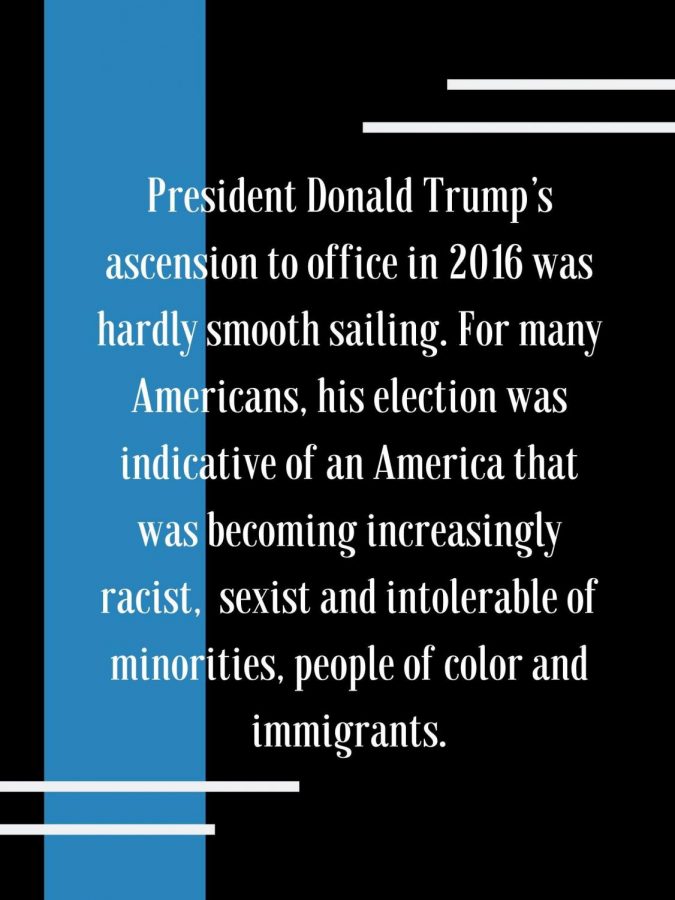America is not as bad as we think
December 13, 2019
 resident Donald Trump’s ascension to office in 2016 was hardly smooth sailing. For many, his election was indicative of an America that was becoming increasingly racist, sexist and intolerable of minorities, people of color and immigrants. Some even declared that the U.S. had become the most racist country in the world.
resident Donald Trump’s ascension to office in 2016 was hardly smooth sailing. For many, his election was indicative of an America that was becoming increasingly racist, sexist and intolerable of minorities, people of color and immigrants. Some even declared that the U.S. had become the most racist country in the world.
At MVHS, it was not uncommon in 2016, nor is it uncommon now, to hear students talking about America’s deep-seated racism. While these individuals’ claims are merited, it’s important to note that there’s a difference between saying that discrimination exists in our country and saying that America is the most racist country in the world.
Yes, the U.S. has issues with racism, as evidenced by excessive use of force by police and racial inequality in the judicial branch, but America’s racism is far from being the worst in the world. As a matter of fact, America, even with its full share of injustices and problems, is far better off than other nations in terms of not just race, but other social issues such as STEM education and LGBTQI+ awareness as well.
Social progress is continuous in the U.S., and things have changed for the better. For example, the Civil Rights movement led by political actors such as Martin Luther King Jr. and Baynard Rustin led to the passage of the Civil Rights Act of 1964, which called for greater social and economic mobility for African-Americans across the nation and banned racial discrimination, providing greater access to resources for women, religious minorities, African-Americans and low-income families.
 The impact of the movement even led to a change in America’s perception of race. In 1942, just 32% of whites agreed that whites and blacks should attend the same schools; in 1995, when the question was last asked, 96% of whites agreed. In 1944, only 45% of whites agreed that blacks should have “as good a chance as white people to get any kind of job,” but by 1972, 97% of whites surveyed agreed with this statement. Finally, in 1958, only 37% of whites said they would vote for a black candidate for president; by 1997 that figure was up to 95%.
The impact of the movement even led to a change in America’s perception of race. In 1942, just 32% of whites agreed that whites and blacks should attend the same schools; in 1995, when the question was last asked, 96% of whites agreed. In 1944, only 45% of whites agreed that blacks should have “as good a chance as white people to get any kind of job,” but by 1972, 97% of whites surveyed agreed with this statement. Finally, in 1958, only 37% of whites said they would vote for a black candidate for president; by 1997 that figure was up to 95%.
What these statistics reveal is not the absence of racism, but rather the positive change in white attitudes toward race relations and a step forward in becoming a more accepting, integrated society. The fact that the aforementioned survey questions are no longer included in major national surveys demonstrates that values of equality have become essentially universally accepted by whites and therefore not deemed worthy of being asked on surveys.
Furthermore, a Washington Post study examining the World Values Survey, which measures global attitudes on various subjects, revealed that along with some Latin countries and many Anglo nations, the U.S. was most likely to embrace a racially diverse neighbor and therefore be more tolerant of diverse social groups. When it comes to racial discrimination in hiring, a study found that American employers do discriminate against minorities but not nearly as much as other nations like France and Sweden.
The era of Trump has pushed for this image that we are more racist than ever before, but this is simply not true. People have begun jumping to the idea that America is a horrible and bigoted country, but making these broad generalizations is dangerous and counter-productive. Instead of exaggerating the current political climate, we should question people when they say that America is the most this and or the most that and ask them “Compared to whom?” Because the truth is, by no plausible objective standard is America the most racist country in the world.
Yes, it has problems. This was seen with the neo-Nazi rally and ensuing violence in Charlottesville, Virginia, and racially charged attacks on a black house of worship in Charleston, South Carolina, among other incidents. But perhaps those problems would be alleviated somewhat if we stopped insisting they’re so much worse than they really are and if we came together, political figures and citizens alike, to address our issues straight on.

















